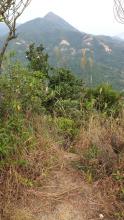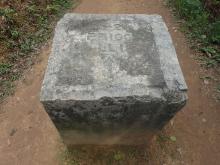Japanese Tunnel at Smugglers Ridge [????- ]
Primary tabs
I read about this tunnel recently in an 1986 newsletter "Military History Notes", written by Philip Bruce:
Perhaps the most extensive Japanese system to be found in Hong Kong is on Smugglers' Ridge, to the south of and overlooking the Shing mun redoubt. There are at least two entrances on the northern face, about 30 feet or so down from the ridge path, well concealed by undergrowth and requiring some effort to locate. It is worth noting that they were uncovered only recently by a former US Marine officer with extensive Vietnam experience.
The main tunnel runs along and under the ridge with many side rooms. There is also a sap running roughly north west which drops down a steep flight of stairs to a form of "sump" which then opens off on either side to emerge at firing positions on the south face. The ridge system dominates the British redoubt in the valley below and all approaches.
Thanks to Roy Delbyck for showing me his copy of this document.
It sounded like a big system, so last Friday I set off with Craig to look for it. It took us a while, but Craig managed to find an entrance. The marker on the map above marks its location.
I think the two large tunnel networks near Jardines' Lookout are still the most extensive, but this is certainly a good size. There are four portals along the north side of the ridge, and two on the south side at a lower level. There is also a curious copper pipe passing through the tunnel (see 9:20 on the video) - any guesses where it was going to, and what it was used for?



Comments
Another Tunnel
Nice and impressive.
Finding the tunnel
As a guide, this photo shows where we left the path to scramble down the hillside. According to my phone I was standing at Lat: 22.373699° Lon: 114.145996° when I took the photo:
Copper Pipe
I visited the tunnels and found the pipe inside; it sticks out of the path on the top of the ridge. I believe it is a grounding antenna for a radio system.
Flight of steep stairs
Recenly, this network of tunnels has been named in Chinese after a "stain" left probably by the iron oxide in the rock, forming something like an animal. Some hikers thought it looked like a deer ... though I think it's got the tail of a squirrel and the snout of a hippocampus. This marking is found at the corner of the biggest side chamber which is near the dead end.